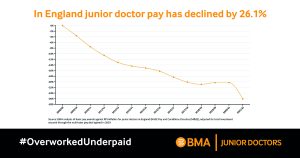Junior doctors began a 72 hour strike this week, which will see them stop work across the NHS, including A&E and intensive care departments. Their work will largely be covered by consultants, who will then not be able to do their normal work leading to the cancellation of appointments and surgery.
The strike is overwhelmingly supported by junior doctors, with a ballot in January delivering one of the biggest mandates for strike action ever seen, a 98% yes vote on a 77.5% turnout.
Junior doctors want pay restoration – since 2008 they have seen a 26% real terms pay cut. The multi-year pay deal agreed with the government in 2019 gave junior doctors in England a 2% increase each year for four years. However, this means that pay has not matched inflation and has fallen in real terms.

In a campaign leading up to the strike, The BMA highlighted how the fast food outlet Pret has given its staff a third pay rise in 12 months, with its baristas able to earn up to £11.80 to £14.10 an hour depending on location and experience.
In contrast, the basic hourly pay of a junior doctor in the first year of work-based training can be as low as £14.09. This is based on a full-time salary of £29,384 for foundation year 1 for 2022-23.
Junior doctors leave university with massive debt, often over £100,000, they then have to pay for exams and professional fees, plus the expense of moving hospitals, perhaps several times, in order to complete their training. Junior doctors are demoralised, crippled by student debt and now hit by the cost-of-living crisis. Many are considering leaving the profession, four in ten (40%) of junior doctors saying that they will leave the NHS as soon as they can find another job.
The NHS can not afford to lose so many doctors at a time when waiting lists are at an all time high.
The junior doctors committee (JDC) of the BMA is asking the Government to commit to restoring junior doctor pay in England to its 2008/09 levels. As of the beginning of 2023, that means an increase of around 35%.
This would increase the £14.09 to £19 per hour, the rate it would have been, if the Government had not cut junior doctor pay in real-terms year-on-year.
Although the 35% figure sounds high, The BMA has calculated that the total gross cost of full pay restoration to the NHS in this financial year (22/23) would be £1.65 billion, which includes the full cost of wage increases, including additional employer costs of National Insurance and pension contributions, but some of this cost will be directly returned to the Treasury through income tax and National Insurance contributions of the employer and the employee. The actual net cost to the Treasury of full pay restoration for Junior Doctors in England in this financial year is approximately £1.03 billion.
The BMA has noted that the £1bn cost is a quarter of what the Government spent on unusable PPE during the COVID pandemic.
The BMA’s Junior Doctors Committee has sought meetings with Steve Barclay, the Health and Care Secretary, to negotiate on pay but little has happened.
Earlier in March, the leaders of the BMA’s Junior Doctors Committee were told at a meeting by Steve Barclay that he does not have the authority or the green light from Rishi Sunak to negotiate with them over pay. The committee co-chairs – Dr Rob Laurenson and Dr Vivek Trivedi – had hoped an offer on the pay deal would be on the table at the meeting The co-chairs, Dr Rob Laurenson and Dr Vivek Trivedi said:
“It is beyond belief that the person in Government appointed to look after our health service, and the staff in it, has no power to put any kind of deal on the table. We went to today’s meeting with every intention of entering into negotiations with a Health Secretary who has known from day one of his tenure what was at stake – tens of thousands of junior doctors in England who are demoralised, exhausted, and vastly underpaid for the valuable work they do. Instead, he wanted to go over those details once more but did not or could not offer any kind of deal, or even start negotiations. Mr Barclay said that mandate lay with the Prime Minister and the Chancellor, yet neither were at the meeting, so we are no further forwards.”
As a result, The BMA said that the Prime Minister and the Chancellor are “wilfully allowing these strikes to go ahead without even trying to negotiate.”
On 10 March the DHSC finally invited the Junior Doctors Committee to a meeting to discuss pay. However as Dr Laurenson noted on Twitter “Unfortunately they weren’t serious and in typical smoke and mirrors fashion used this to kick the can down the road. The Secretary of State once again did not turn up.”
“Once again they came with nothing and no one of note. We [the junior doctors] continue to be open to have meaningful negotiations and have put our opening offer on the table. How can we negotiate when they won’t put a number on the table?”
Dear Reader,
If you like our content please support our campaigning journalism to protect health care for all.
Our goal is to inform people, hold our politicians to account and help to build change through evidence based ideas.
Everyone should have access to comprehensive healthcare, but our NHS needs support. You can help us to continue to counter bad policy, battle neglect of the NHS and correct dangerous mis-infomation.
Supporters of the NHS are crucial in sustaining our health service and with your help we will be able to engage more people in securing its future.
Please donate to help support our campaigning NHS research and journalism.


